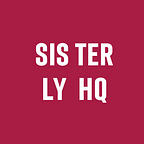What To Do When Your Private Photos or Nudes Are Leaked in Nigeria
A Conversation With Ilamosi Ekenimoh, Lawyer and Policy Co-ordinator at ElectHer
The non-consensual sharing of private photos or nudes is much more common than you think. In some countries, as many as 1 in 12 adults have been victims, while 1 in 20 adults have been perpetrators. The Covid 19 pandemic has also increased the occurrence of revenge porn, reporting as much as a 22% increase in the United Kingdom. Most of the victims are women.
In Nigeria, little data is available to measure the occurrence of leaked nudes. Even more little, is information on what to do if your private photos are shared without consent, as a Nigerian woman. A few weeks ago, Sisterly HQ made an Instagram post on what steps to take, if your private photos or nudes are leaked. Check it out here.
Taking the conversation further, we asked Nigerian lawyer and policy co-ordinator, Ilamosi Ekenimoh, what practical steps Nigerian women can take if their private photos or nudes are leaked online.
Here’s what she said.
- Gather evidence. Take as many screenshots as possible. Also, share the posts and screenshots with as many trusted people as you can. This helps you to have the evidence if it is eventually deleted. Private images are usually shared through burner accounts. So, gathering evidence is important. It helps that it is time-stamped because if you want to sue, it would be key.
- Narrow down the culprits. It is important to narrow down the persons that you sent the images. Who are the persons that had access to those images? This would help you identify who could have possibly shared the photos. It is also important, because of the next step.
- Ask a lawyer to send a cease and desist letter to the person or persons you sent the images to. Yes, all of them! The lawyer could draft the letter in a way that explains that if a person is the culprit, they should take it down or face consequences, or if they had nothing to do with the leak, they should ignore the letter.
- Report on social media. If the image is shared on social media, report the account and the post. Also, ask others to report the account and the post.
- If you have successfully identified the culprit, contact persons of power or authority over them. For example, if it is a student, you can contact their school authorities e.g. the Dean of Student Affairs. If it is an employee, you can contact their organization or company. This would most likely get them to take down the posts.
- Contact a lawyer. Share all of the evidence you have gathered with them. Share the links, screenshots and other information with your lawyer.
- Typically, you would be advised to go to the police. However, in Nigeria, this may be futile. The police may not do anything about it, and they may ask you to share the photos with them, which is not advised.
- Instead, you can contact an NGO that specializes in going after persons that leak private photos. They would be able to help with this. You can contact Justice Beyond Hashtags (08073349075) and other organizations such as Stand To End Rape, that assist in cases of sexual violence.
- You can also contact a government agency or parastatal that handles similar cases, or incidences of sexual violence in Nigeria. An example of this is Lagos State’s Domestic and Sexual Violence Response Team (DSVRT).
Ilamosi has a multifunctional background in Law and Legal Research, Internet policy and regulation and Human rights advocacy. Ilamosi is passionate about the intersection between government policy and women’s rights. She currently multitasks as a legal practitioner, a policy co-ordinator at ElectHer, a National Executive Committee member at Youth Party, and Aunt of the year.
Connect with Ilamosi on Instagram
